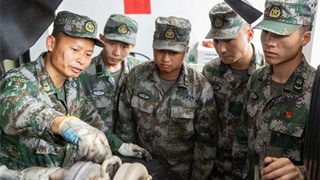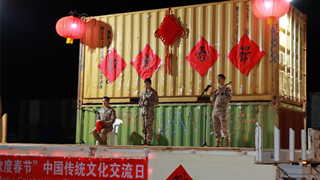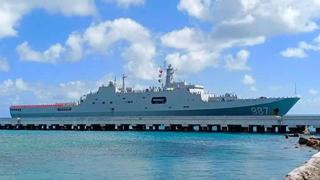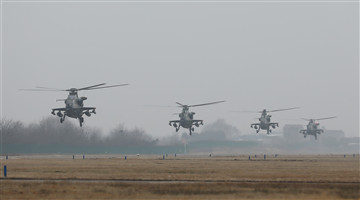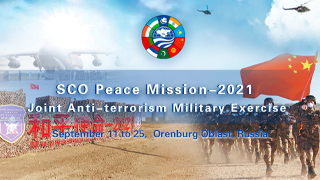Former Japanese Prime Minister Shinzo Abe, commenting on the Russia-Ukraine conflict on a Fuji TV program, once again mentioned the issue of so-called nuclear sharing with the United States, and also called on the United States to abandon its strategic ambiguity on the Taiwan question.
日本前首相安倍晋三27日在富士电视台一档节目上评论俄乌冲突时,再次提到与美国“核共享”的问题,还呼吁美国放弃在台湾问题上的“战略模糊”政策。
According to news from Japan’s Sankei Shinbun on February 27, Abe advocated in the program that Japan should break through the existing taboo, and explore with the United States on "nuclear sharing" related issues. And referring to the "strategic ambiguity" adopted by the US about Taiwan island, he called on the US to expressly state the so-called determination to “defend Taiwan”.
据日本《产经新闻》27日消息,安倍在节目中鼓吹日本国内应该突破现有禁忌,探讨与美国的“核共享”相关问题。在谈到美国对台湾采取的“战略模糊”政策时,他呼吁美国有必要明确表示“保卫台湾”。
This wasn’t the first time that Abe linked the escalated Russia-Ukraine conflict with the Taiwan question. At a meeting of the House of Representatives on February 25th, he had said that this is a critical moment for Japan as it reminds us of what China will do concerning Taiwan.
在俄乌危机升级后,这不是安倍第一次将该问题与台湾问题联系在一起。安倍25日在众议院议员会馆的一场会议上,就俄乌冲突发表评论称,这对日本来说也是一个严峻的时刻,可以预测中国将如何应对台湾(问题)。
Hu Jiping, vice president and research fellow at China Institutes of Contemporary International Relations, analyzed on February 27 that Japan, the only country that was subject to nuclear attacks and a contracting party to the Treaty on the Non-Proliferation of Nuclear Weapons(NPT), allegedly studied in secret the possibility of possessing nuclear weapons back in the Cold War period, but gave it up because it concluded that would be too politically and diplomatically costly.
中国现代国际关系研究院副院长、研究员胡继平27日分析称,日本作为唯一遭受核武器打击的国家、《核不扩散条约》的缔约国,据说早在冷战时就秘密研究过拥核的可能性,但因为政治和外交成本过高,结论是拥核得不偿失。
After the Cold War, certain Japanese politicians publicly proposed to re-discuss the possibility and develop small nuclear weapons on the ground of self-defense, but that hit a wall due to the international political reality and domestic objection.
冷战后日本个别政治家曾公开提议探讨拥核问题,甚至主张以自卫的理由发展小型核武器,但由于国际政治现实和国内反核声音仍然强大,发展核武器几乎没有可行性。
Besides, even if Washington was to provide nuclear protection for Tokyo, it didn’t have to deploy the weapons in Japan – which instead would cause a new strategic imbalance. Therefore, when talking about nuclear weapons, Abe was either truly ignorant of the facts and factors or he was trying to ride the wave of the current hot-spot in a bid to hype up threats from other countries.
另外,如果美国对日本提供核保护,并不一定要将核武器部署在日本,部署反而会引起新的战略不平衡。安倍关于核武器的说法,要么是不懂,要么就是为“蹭热度”,目的还是借此渲染别国威胁。
Moreover, Hu believes Abe’s linking the Taiwan question with the current Russia-Ukraine conflict is ill-intended. Taiwan is an inherent part of China and the Taiwan question is China’s internal affair, whereas the Ukraine issue is completely different, not to mention Japan’s claim to abide by the One-China principle.
此外,胡继平认为,安倍将台湾问题与当前的乌克兰危机联系起来是居心叵测。因为台湾属于中国的一部分,台湾问题属于中国内政,与乌克兰问题有着根本不同,而且日本也表示坚持一个中国原则。
Abe and other right-wingers in Japan may expect the US to be more unambiguous on the Taiwan question to deter the Chinese mainland and sabotage China’s reunification process by keeping the mainland and the island permanently apart. Yet on America’s part, giving up the ambiguity would be a professed violation of its diplomatic commitment, which might embolden the “Taiwan independence” forces and trigger conflicts across the Taiwan Strait, and that is not in America’s best interests. Therefore, the US won’t change its stance easily.
安倍等日本右翼势力在台湾问题上可能确实期待美国改变模糊立场,以更清晰的立场威慑中国大陆,使两岸分离长期化,阻止中国统一。但美国放弃模糊战略,明显公然违背外交承诺,甚至会鼓励“台独”、引发两岸冲突,这并不符合美国利益,所以美国不会轻易改变。
Hu added that one of the reasons why Abe brought up the Taiwan question in the middle of the Russia-Ukraine conflict is to continue hyping up the so-called “China threat” and arouse the sense of crisis among the Japanese public. He wanted to sway the domestic debate over the development of basic attack capabilities against enemies and further clear the way for revising relevant strategic documents and laws, breaking away from security restrictions, and developing military strengths.
胡继平表示,安倍在此时“蹭热度”渲染台湾问题,目的之一是继续渲染“中国威胁”,唤起日本民众的“危机感”,影响国内关于“发展对敌基础进攻能力”的讨论,为日本修改相关战略文件和法律、进一步突破安全政策和发展军备开道。
